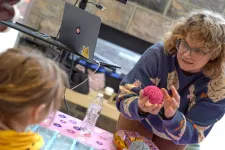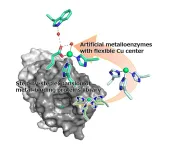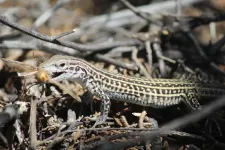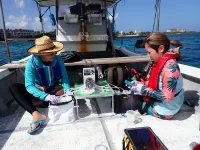(Press-News.org) Scientists at the Fralin Biomedical Research Institute at VTC are looking to uncover the “why” of the American diet. Why are people drawn to ultra-processed foods, which have been linked to obesity, Type 2 diabetes, different types of cancer, and increased risk of heart disease and death?
It’s a critical question because ultra-processed foods make up about 58 percent of calories consumed in the United States. These foods have been through multiple manufacturing processes and contain many added ingredients. Examples include sweetened cereals, hot dogs, chips, and soft drinks.
“We have seen an explosion of these foods in our environment since the 1980s,” said Alexandra DiFeliceantonio, an assistant professor with the Fralin Biomedical Research Institute at VTC and associate director of the institute’s Center for Health Behaviors Research.
With support from a $2.2 million grant from the National Institute of Diabetes and Digestive and Kidney Diseases, part of the National Institutes of Health, her lab is recruiting participants for a study that will combine metabolic, neural, and behavioral measures with statistical modeling to uncover what drives people to reach for ultra-processed foods.
“We want to understand what it is in particular about these foods that leads to changes in body, brain, and behavior,” said DiFeliceantonio, who also holds an appointment in the Department of Human Nutrition, Foods, and Exercise in the College of Agriculture and Life Sciences. “What are the underlying variables we have not thought about yet?”
The study will focus on the way the body processes different foods, taking into account features of the food itself. The goal is to identify specific properties of ultra-processed foods that support their consumption, the physiological and neurobiological mechanisms they exploit in the brain, and the individual factors that make people susceptible to overconsumption.
DiFeliceantonio said a better understanding of why these foods are so rewarding and overconsumed will lead to better strategies to improve health. The findings could provide evidence needed for changing dietary guidelines, with the goal of reducing diet-related mortality and disease.
“I see it as my job as a scientist to provide that information so people can make informed decisions about feeding themselves, and feeding their families, in a healthy way,” DiFeliceantonio said.
END
Researchers hope to uncover hidden mechanisms of why ultra-processed foods are so rewarding – and so overconsumed
Virginia Tech scientist at Fralin Biomedical Research Institute to study the allure of highly processed foods, which make up 58 percent of calories consumed in the United States
2023-03-29
ELSE PRESS RELEASES FROM THIS DATE:
Fermented coffee’s fruity aromas demystified
2023-03-29
INDIANAPOLIS, March 29, 2023 — Specialty coffees are gaining traction in coffeehouses around the world — and now a fermented version could bring a fruity taste to your morning cup of joe. This new kind of beverage has a raspberry-like taste and aroma, but what causes these sensations has been a mystery. Today, scientists report six compounds that contribute to the fermented coffee experience. The work could help increase production of the drink and make it more readily available for everyone to enjoy.
The researchers ...
Obesity treatment could offer dramatic weight loss without surgery or nausea
2023-03-29
INDIANAPOLIS, March 29, 2023 — Imagine getting the benefits of gastric bypass surgery without going under the knife — a new class of compounds could do just that. In lab animals, these potential treatments reduce weight dramatically and lower blood glucose. The injectable compounds also avoid the side effects of nausea and vomiting that are common with current weight-loss and diabetes drugs. Now, scientists report that the new treatment not only reduces eating but also boosts calorie burn.
The researchers will present their results today at the spring meeting of the American Chemical Society ...
Success in simple creation of artificial metalloenzymes with high stereoselectivity
2023-03-29
Enzymes work in the cells of all living organisms, allowing specific and complex reactions to be carried out quite easily. However, few natural enzymes are effective for industrial applications, which could benefit greatly from discoveries that make targeted enzyme creation a reality.
Artificial metalloenzymes can be created simply by binding metal ions or metallic compounds to proteins, so that they exhibit enzymatic activity. Currently, metalloenzymes are being studied to discover new functions or improve their reactivity ...
Lizards at US Army installation are stress eating during flyovers
2023-03-29
Lizards may be small, with only a single hearing bonelet compared to our three, and without earflaps, but their hearing is typically good. Most lizards can hear frequencies between 100 and 5,000 Hz (although they are most sensitive between 400 and 1,500 Hz), compared to between 20 and 20,000 Hz in humans. So how do lizards react to noise pollution?
Here, scientists studied the impact of noise from low-flying military aircraft on the behavior and well-being of an uncommon lizard, the Colorado checkered whiptail (Aspidoscelis neotesselatus). This ...
How whale shark rhodopsin evolved to see, in the deep blue sea!
2023-03-29
A research group including Professors Mitsumasa Koyanagi and Akihisa Terakita of the Osaka Metropolitan University Graduate School of Science has investigated both the genetic information and structure of the photoreceptor rhodopsin, responsible for detecting dim light, of whale sharks to investigate how they can see in the dim light at extreme depths. The research group compared the whale sharks to zebra sharks, which are considered their closest relative, and brown-banded bamboo sharks, which are in the same group: the order orectolobiformes—commonly known as carpet sharks.
“This research used genetic ...
Strengthening general practice will save lives, researcher argues
2023-03-29
In his new book Primary Health Care and Population Mortality, released next week, Professor Richard Baker draws on international evidence to show how primary health care is key to the effect of health systems on population mortality and inequality in mortality. His conclusion is that it is time to think about primary health care in a new way.
He explains: “It is as if policymakers think primary health care is little more than a triage mechanism for the health system, that its purpose is to manage access to other ...
Light-bending gravity reveals one of the biggest black holes ever found
2023-03-29
A team of astronomers has discovered one of the biggest black holes ever found, taking advantage of a phenomenon called gravitational lensing.
The team, led by Durham University, UK, used gravitational lensing - where a foreground galaxy bends the light from a more distant object and magnifies it – and supercomputer simulations on the DiRAC HPC facility, which enabled the team to closely examine how light is bent by a black hole inside a galaxy hundreds of millions of light years from Earth.
They found an ultramassive black hole, an object over 30 billion times the ...
Detecting coral biodiversity in seawater samples
2023-03-29
Researchers from the Okinawa Institute of Science and Technology (OIST) have developed a method to measure coral biodiversity through extracting the environmental DNA (or eDNA) from a liter of surface seawater collected from above a reef. The method has been confirmed to work through observations made by scientific divers in the same areas of ocean. The research, conducted in collaboration with the Okinawa Prefecture Environmental Science Center and University of Tokyo, was published in the Proceedings of the Royal Society B: Biological Sciences. This has paved the way for large-scale comprehensive surveys of reef-building coral to take place and removes the reliance of ...
Research autopsies reveal how incurable skin cancer resists treatment
2023-03-29
Scientists have found out how some skin cancers stop responding to treatment at the end of life.
An in-depth analysis of 14 patients who died from incurable melanoma has revealed that changes to the order, structure and number of copies of tumour DNA could cause some skin cancers to resist treatment. These changes also explain how melanoma can spread to other parts of the body.
The research, published today (29th March) in the journal Cancer Discovery, was led by scientists and clinicians at the Francis Crick Institute, UCL and The Royal Marsden. It is part of the Cancer ...
COVID vaccine induces robust T cell responses in blood cancer patients
2023-03-29
Researchers found that, despite being heavily immunocompromised, haematology patients generate strong cellular immune responses against SARS-CoV-2 after vaccination, on par with that of healthy individuals.
Published today in Cell Reports Medicine, the research team, led by University of Melbourne Professor Katherine Kedzierska, a Laboratory Head at the Peter Doherty Institute for Infection and Immunity (Doherty Institute), undertook the most comprehensive analysis of adaptive SARS-CoV-2 immunity to ...
LAST 30 PRESS RELEASES:
Hairdressers could be a secret weapon in tackling climate change, new research finds
Genetic risk for mental illness is far less disorder-specific than clinicians have assumed, massive Swedish study reveals
A therapeutic target that would curb the spread of coronaviruses has been identified
Modern twist on wildfire management methods found also to have a bonus feature that protects water supplies
AI enables defect-aware prediction of metal 3D-printed part quality
Miniscule fossil discovery reveals fresh clues into the evolution of the earliest-known relative of all primates
World Water Day 2026: Applied Microbiology International to hold Gender Equality and Water webinar
The unprecedented transformation in energy: The Third Energy Revolution toward carbon neutrality
Building on the far side: AI analysis suggests sturdier foundation for future lunar bases
Far-field superresolution imaging via k-space superoscillation
10 Years, 70% shift: Wastewater upgrades quietly transform river microbiomes
Why does chronic back pain make everyday sounds feel harsher? Brain imaging study points to a treatable cause
Video messaging effectiveness depends on quality of streaming experience, research shows
Introducing the “bloom” cycle, or why plants are not stupid
The Lancet Oncology: Breast cancer remains the most common cancer among women worldwide, with annual cases expected to reach over 3.5 million by 2050
Improve education and transitional support for autistic people to prevent death by suicide, say experts
GLP-1 drugs like Ozempic could cut risk of major heart complications after heart attack, study finds
Study finds Earth may have twice as many vertebrate species as previously thought
NYU Langone orthopedic surgeons present latest clinical findings and research at AAOS 2026
New journal highlights how artificial intelligence can help solve global environmental crises
Study identifies three diverging global AI pathways shaping the future of technology and governance
Machine learning advances non targeted detection of environmental pollutants
ACP advises all adults 75 or older get a protein subunit RSV vaccine
New study finds earliest evidence of big land predators hunting plant-eaters
Newer groundwater associated with higher risk of Parkinson’s disease
New study identifies growth hormone receptor as possible target to improve lung cancer treatment
Routine helps children adjust to school, but harsh parenting may undo benefits
IEEE honors Pitt’s Fang Peng with medal in power engineering
SwRI and the NPSS Consortium release new version of NPSS® software with improved functionality
Study identifies molecular cause of taste loss after COVID
[Press-News.org] Researchers hope to uncover hidden mechanisms of why ultra-processed foods are so rewarding – and so overconsumedVirginia Tech scientist at Fralin Biomedical Research Institute to study the allure of highly processed foods, which make up 58 percent of calories consumed in the United States






